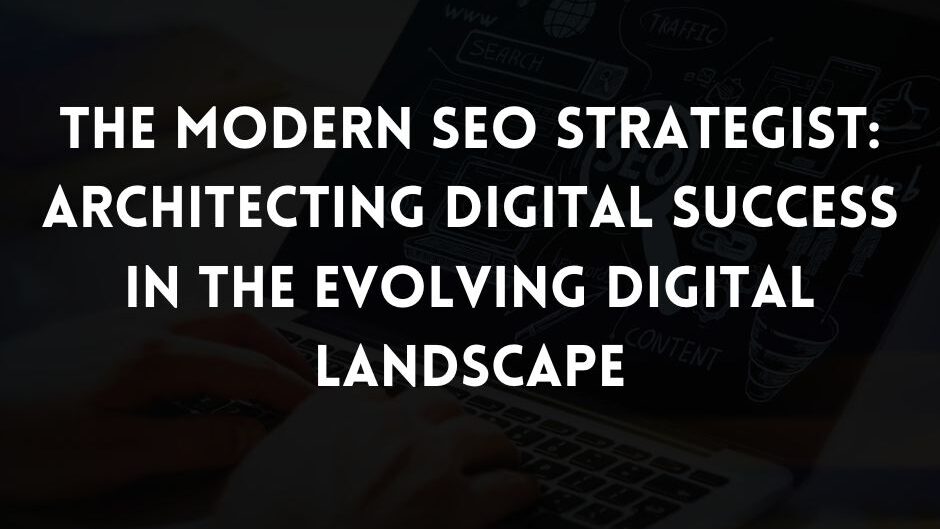
In today’s hypercompetitive digital ecosystem, search engine optimization (SEO) has transcended its traditional role as a tactical marketing function to become a cornerstone of strategic business growth. The modern SEO strategist is no longer just a practitioner of keyword optimization and link-building; they are the architects of an organization’s organic search presence, wielding a deep understanding of search algorithms, user behavior, and digital marketing principles to drive sustainable online growth. This role demands a unique blend of technical expertise, analytical prowess, and strategic vision to navigate the complexities of an ever-evolving digital landscape.
Core Functions and Strategic Impact
1. Strategic Planning and Leadership
The SEO strategist operates at the intersection of technology, marketing, and business strategy. They are responsible for developing comprehensive roadmaps that align with broader organizational objectives. This involves:
- Developing Quarterly and Annual SEO Strategies: Crafting detailed plans that outline key initiatives, timelines, and resource allocations to achieve measurable business outcomes.
- Establishing KPIs and Success Metrics: Defining clear performance indicators to track progress and demonstrate ROI, such as organic traffic growth, conversion rates, and revenue attribution.
- Cross-Functional Collaboration: Working closely with C-suite executives, marketing teams, content creators, and web developers to ensure SEO initiatives are integrated into the broader business strategy.
- Team Leadership and Agency Management: Building, managing, and mentoring specialized SEO teams or overseeing external agencies to execute strategies effectively.
- Resource Allocation and Budget Management: Optimizing budgets to ensure maximum ROI while balancing short-term wins with long-term strategic goals.
2. Advanced Keyword Intelligence
Keyword research has evolved far beyond basic search volume analysis. Modern SEO strategists employ sophisticated methodologies to uncover opportunities and align content with user intent:
- Search Intent Mapping: Analyzing and categorizing keywords based on user intent (informational, navigational, transactional) to create content that meets audience needs at every stage of the customer journey.
- Semantic Relationship Analysis: Leveraging natural language processing (NLP) tools to understand the relationships between search terms and optimize for contextual relevance.
- Competitive Keyword Gap Analysis: Identifying gaps in competitors’ keyword strategies to uncover untapped opportunities.
- Topic Cluster Identification: Developing content architectures that establish topical authority and improve search visibility through pillar pages and supporting content.
- Voice and Long-Tail Keyword Optimization: Capitalizing on the rise of voice search and long-tail queries to capture niche audiences and improve rankings.
3. Technical SEO Leadership
A robust technical foundation is critical for SEO success. SEO strategists must possess deep expertise in website architecture and performance optimization:
- Site Architecture Optimization: Designing and refining site structures to enhance crawlability, indexability, and user experience.
- Core Web Vitals Enhancement: Prioritizing user experience metrics such as loading speed, interactivity, and visual stability to meet Google’s page experience criteria.
- Mobile-First Indexing: Ensuring websites are fully optimized for mobile devices, which now dominate search traffic.
- JavaScript SEO: Addressing the challenges of JavaScript-heavy websites to ensure proper indexing and rendering.
- International SEO: Implementing hreflang tags, geo-targeting, and localized content strategies to optimize for global audiences.
- Migration Planning: Overseeing seamless website migrations to prevent traffic loss and maintain search rankings.
- Schema Markup Strategy: Leveraging structured data to enhance search engine understanding and improve visibility in rich snippets.
4. Content Strategy and Optimization
Content remains the backbone of SEO, and strategists play a pivotal role in guiding its creation and optimization:
- Content Gap Analysis: Identifying gaps in existing content to address unmet user needs and capitalize on emerging opportunities.
- Editorial Calendar Development: Planning and scheduling content production to align with SEO goals and business objectives.
- Content Performance Measurement: Tracking and analyzing content performance to refine strategies and maximize ROI.
- Topic Authority Building: Creating comprehensive, authoritative content that establishes the organization as a thought leader in its industry.
- Content Consolidation and Pruning: Streamlining content libraries by merging redundant pages and removing outdated or low-performing content.
- Rich Snippet Optimization: Enhancing content to appear in featured snippets, knowledge panels, and other SERP features.
- Entity Optimization: Leveraging entity-based SEO to improve visibility in knowledge graphs and other semantic search applications.
5. Advanced Analytics and Reporting
Data-driven decision-making is at the heart of modern SEO strategy. Strategists must excel in analyzing and interpreting complex datasets:
- Custom Dashboard Development: Creating tailored dashboards to monitor key metrics and provide actionable insights.
- Google Analytics 4 Implementation: Leveraging GA4’s advanced capabilities to track user behavior and measure campaign performance.
- Search Console Integration: Utilizing Search Console data to identify technical issues, monitor rankings, and uncover new opportunities.
- ROI Analysis and Attribution Modeling: Measuring the financial impact of SEO efforts and attributing revenue to specific initiatives.
- Competitive Intelligence: Analyzing competitors’ strategies to identify strengths, weaknesses, and opportunities.
- Machine Learning-Powered Insights: Harnessing AI-driven tools to uncover patterns and predict future trends.
- Predictive Analytics: Using historical data to forecast performance and inform strategic decisions.
Industry Evolution and Future-Proofing
1. Emerging Technologies and SEO
The rapid pace of technological innovation continues to reshape the SEO landscape. Strategists must stay ahead of trends such as:
- Artificial Intelligence and Machine Learning: Understanding how AI-driven algorithms impact search rankings and user behavior.
- Natural Language Processing (NLP): Optimizing content for conversational search and voice assistants.
- Mobile-First and Mobile-Only Considerations: Adapting strategies to meet the needs of mobile-dominated audiences.
- Voice Search Optimization: Tailoring content to align with the conversational tone of voice queries.
- Visual Search Optimization: Optimizing images and videos to capitalize on the growing popularity of visual search.
- Augmented Reality (AR) Integration: Exploring opportunities to leverage AR for immersive user experiences.
2. Algorithm Understanding and Adaptation
Search engines are constantly refining their algorithms, requiring strategists to adapt quickly:
- Core Algorithm Updates: Analyzing and responding to major updates to maintain or improve rankings.
- E-A-T Optimization: Demonstrating expertise, authoritativeness, and trustworthiness to align with Google’s quality guidelines.
- Page Experience Signals: Prioritizing user experience metrics such as Core Web Vitals and mobile-friendliness.
- MUM (Multitask Unified Model) Considerations: Preparing for Google’s next-generation AI model, which aims to understand complex queries across multiple formats.
- BERT Optimization: Ensuring content aligns with Google’s language understanding capabilities.
Business Impact and Value Creation
1. Revenue Generation
SEO strategists play a direct role in driving business growth through:
- Organic Traffic Growth: Implementing strategies to increase visibility and attract high-quality traffic.
- Conversion Rate Optimization (CRO): Enhancing user experience to improve conversion rates and maximize revenue.
- Customer Journey Optimization: Mapping and optimizing the customer journey to reduce friction and increase engagement.
- Lead Generation: Creating content and landing pages designed to capture and nurture leads.
- E-Commerce Optimization: Improving product visibility and user experience to drive online sales.
- Local SEO Revenue Optimization: Enhancing local search visibility to attract nearby customers.
2. Cost Efficiency
SEO offers significant cost advantages over paid advertising:
- Reduced Paid Advertising Dependence: Lowering reliance on paid channels by driving organic traffic.
- Improved Marketing ROI: Delivering long-term results with minimal ongoing investment.
- Enhanced Content Efficiency: Maximizing the value of existing content through optimization and repurposing.
- Optimized Resource Allocation: Focusing efforts on high-impact initiatives to achieve maximum results.
- Reduced Customer Acquisition Costs: Attracting customers organically at a lower cost than paid channels.
3. Competitive Advantage
A well-executed SEO strategy creates sustainable competitive advantages:
- Market Share Growth: Outperforming competitors in search rankings to capture a larger share of organic traffic.
- Brand Authority Building: Establishing the organization as a trusted leader in its industry.
- Industry Leadership Positioning: Leveraging SEO to enhance thought leadership and brand visibility.
- Digital Asset Optimization: Maximizing the value of digital assets such as websites, blogs, and social media profiles.
- Customer Experience Enhancement: Improving site usability and content relevance to create positive user experiences.
Required Skills and Expertise
1. Technical Proficiency
Modern SEO strategists must possess a diverse skill set, including:
- HTML, CSS, and JavaScript Understanding: Basic coding knowledge to communicate effectively with developers.
- Content Management System (CMS) Expertise: Familiarity with platforms like WordPress, Shopify, and Drupal.
- Analytics Platform Mastery: Proficiency in tools like Google Analytics, Google Tag Manager, and Data Studio.
- Technical SEO Tools Proficiency: Experience with tools like Screaming Frog, Ahrefs, and SEMrush.
- API Integration Knowledge: Understanding how APIs can enhance data collection and analysis.
- Database Query Understanding: Basic SQL skills to extract and analyze data.
2. Business Acumen
Success in SEO requires a strong understanding of business principles:
- Digital Marketing Strategy: Aligning SEO initiatives with broader marketing goals.
- Business Metrics and KPIs: Measuring and communicating the impact of SEO on business outcomes.
- Budget Management: Allocating resources effectively to maximize ROI.
- Project Management: Overseeing complex projects with multiple stakeholders.
- Stakeholder Communication: Presenting insights and recommendations to executives and team members.
- Team Leadership: Inspiring and guiding teams to achieve shared objectives.
3. Analytical Capabilities
Data analysis is at the core of strategic decision-making:
- Statistical Analysis: Interpreting data to identify trends and patterns.
- Data Visualization: Creating clear and compelling visualizations to communicate insights
